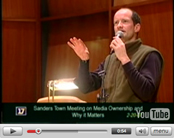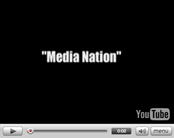'New news vs Old news' is an old story
The crux of Tom Regan's thesis (article below) is: "The reality in today's world of online journalism is that both old and new views count, and traditional journalists ignore this at their own peril."
He defines "new" news views as youth interests such as stories about the iPhone and "old" views as NY Times stories about the Iraq war. I see it as more than youth vs aged.
Expanding Regan's definitions, one might suggest materialistic/entertainment news vs. history-based political news or uninformed vs. disciplined. The former requires little education or work; the latter necessitates an accumulated store of background knowledge, i.e., education.
Regan recommends the further tabloidization of "traditional" news sources (more iPhone articles) as a financial solution to a universal social problem, that is, people will always slow down to look at a car wreck, but resist the discipline necessary to drive safely and buy safer cars.
This has played out down through our species' incredibly violent history. People would rather fight than learn. We would rather sue than mediate, and our leaders (role models) accept negative consequences rather than compromise.
Perhaps media education can suggest the value of long term satisfaction vs. short term gratification.
On Sep 26, 2007, at 9:21 PM, Tom Regan wrote:
http://www.csmonitor.com/2007/0926/p17s01-stct.html
Who controls the news? On the Web, you can.
Sites where readers vote on what's news are a challenge that traditional news organizations ignore at their peril.
By Tom Regan | Columnist
If you could create a newspaper based on what you and your friends like to read, would it look different from the front page of The Christian Science Monitor? Or The New York Times? Or even your local paper? Now, thanks to the Internet, you can. Social network news websites make it possible by allowing users essentially to vote on what they consider news.
The Project for Excellence in Journalism (PEJ) decided to explore the differences between what the editors of The New York Times considered a top story as opposed to the readers of three user-driven sites: Del.icio.us, Digg, and Reddit. The PEJ people also included Yahoo News's Most Recommended, Most Viewed, and Most E-mailed in their study. What they found was interesting, but not unexpected for anyone who frequently reads both sources of content.
The PEJ report, "The Latest Headline, Your Vote Counts" (available at www.journalism.org/node/7493) mentions that: "In a week when the mainstream press was focused on Iraq and the debate over immigration, the three leading user-news sites – Reddit, Digg, and Del.icio.us – were more focused on stories like the release of Apple's new iPhone and that Nintendo had surpassed Sony in net worth."
As someone who has worked in online media for a long time, I have experienced the way people in traditional media react when they see something like this – it's generally seen as more proof that the Internet is corrupting the news and that people aren't paying attention to the stories that really count. There is a certain amount of fear in such reactions, because while traditional journalists are aware that there is a sea change in news, they aren't completely sure what that will mean for their future.
But journalists should not go out on the ledge over the PEJ report. As good as it is, it has one glaring flaw: It doesn't account for the age of the visitors to each site. Since Digg, Reddit, and Del.icio.us fit into the social-networking world, their users are much younger than online readers of traditional media. And when you're 25 and single, what you consider important is very different from what you would choose if you were 45 with three kids and a mortgage. Younger people probably will be more interested in an iPhone than news of the mortgage industry meltdown.
Still, the PEJ study shows that when Web users are given the opportunity, they do make different news choices than professional journalists do. And they get their news from different sources. The top stories in the three social-networking news sites predominately came from nontraditional news sites and blogs. The reality in today's world of online journalism is that both old and new views count, and traditional journalists ignore this at their own peril.
But that doesn't mean these two approaches can't live together in our new media universe. For instance, in 2004 the Monitor had a story about a Chilean newspaper that builds the front page of its print edition based on what people read on its website. As a result, the paper has a wider and more diverse selection of news than a traditional paper.
Another example of the changing face of journalism is DailySource.org, where Web users suggest what stories should appear on it. The website has a small group of paid editors, but it mostly relies on volunteers scattered across the United States to select the news it features on its site each day. (Volunteers don't have to be professional journalists. They just have to be interested in the news.)
Along with traditional news sources, it also features video from sites like YouTube and material from blogs. On the left-hand navigation bar, users will find a link that says "submit an article" where they can do just that. Those suggestions are considered by editors who select the top stories. (Full disclosure: I've acted occasionally as an adviser to the site because I think their project is such an intriguing one.)
The site is the brainchild of Peter Dunn, a journalist and a former media coach and consultant. Mr. Dunn's long-term goal is to have a DailySource module for cities across the US, where people could help contribute to their local news coverage.
"Instead of relying on the stretched resources of one paper," Dunn says, "People could get high-quality articles and information from over a thousand publications including daily papers, television network sites, newsmagazines, journals, blogs, and others.
"But it's more than just news. I would love to see these local daily sources become a place where people could find resources and share stories about their communities and share ideas about how to solve problems – and even share solutions with other communities facing similar issues."
Hybrid news sites like DailySource.org as well as social networking sites like Digg, Reddit, and Del.icio.us illustrate the decentralizing power of the Internet. People are no longer content to be told by traditional news gatekeepers that "this is news." More and more Web users are replying, "Well, so is this." And smart journalists and editors are listening to what they have to say.



![View your cart items []](/sites/default/modules/ecommerce/cart/images/cart_empty.png)




